

Social Media Monitoring Tools: 26 Free Online Reputation Tools. The Nature of the Future. The Nature of the Future: Dispatches from the Socialstructed World outlines Marina’s vision of a new world we are moving into, in which amplified individuals—people empowered with technologies and connections to each other—can do the kinds of things previously only large organizations or no organization could.
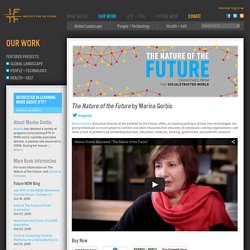
In the book, Marina describes how this new way of creating value is already transforming many sectors, from education to banking, governance, science, and health. The changes underway are exciting and challenging, as they require us to re-think existing institutional structures, processes, and management paradigms. Marina hopes to catalyze discussions about these important issues and engage people in building the foundations for the new socialstructed economy and society. Social technologies are not new, but their impact on our entire social system is changing. Packet switching, as the technology would later be called, was the foundation for the Internet. Your Reputation Will Be The Currency Of The Future. In The Nature Of The Future: Dispatches From The Socialstructed World, Marina Gorbis argues we are moving away from the depersonalized world of institutional production toward a new economy built on social connections and rewards--a process she calls socialstructing.
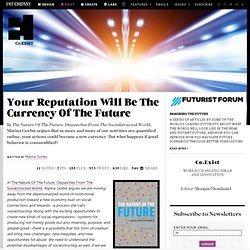
Along with the exciting opportunities to create new kinds of social organizations--systems for producing not merely goods but also meaning, purpose, and greater good--there is a possibility that this form of creation will bring new challenges, new inequities, and new opportunities for abuse. We need to understand the potential disadvantages of socialstructing as well, if we are to minimize the potential pitfalls. The following is an excerpt from the book, available April 9.
In his novel Dead Souls, originally published in 1842, the celebrated Russian writer Nikolai Gogol paints the exploits of Chichikov, a man on the lower rungs of Russian society. Exploring the relationship between perceptions of social capital and enacted support online - Stefanone - 2012 - Journal of Computer-Mediated Communication. Abstract Online social networking sites enable users to connect with large, heterogeneous groups of people.
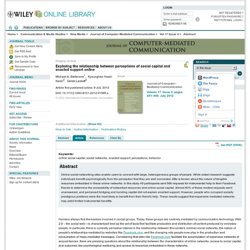
While extant research suggests individuals benefit psychologically from the perception that they are well connected, little is known about the nature of tangible resources embedded in these online networks. In this study 49 participants sent 588 requests for instrumental help to their Facebook friends to determine the accessibility of networked resources and online social capital.
Almost 80% of these modest requests went unanswered, and perceived bridging and bonding capital did not explain enacted support. However, people who occupied socially prestigious positions were the most likely to benefit from their friend's help. Humans always find themselves involved in social groups.
Reputation Creation. ReputationGT. 8 reasons why online reputation building can give academics a competitive advantage. Rachel Botsman: The currency of the new economy is trust. Rachel Botsman. Welcome to the new reputation economy. This article was taken from the September 2012 issue of Wired magazine.
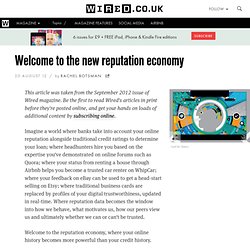
Be the first to read Wired's articles in print before they're posted online, and get your hands on loads of additional content by subscribing online. Imagine a world where banks take into account your online reputation alongside traditional credit ratings to determine your loan; where headhunters hire you based on the expertise you've demonstrated on online forums such as Quora; where your status from renting a house through Airbnb helps you become a trusted car renter on WhipCar; where your feedback on eBay can be used to get a head-start selling on Etsy; where traditional business cards are replaced by profiles of your digital trustworthiness, updated in real-time.
Where reputation data becomes the window into how we behave, what motivates us, how our peers view us and ultimately whether we can or can't be trusted. In September 2008, Atwood and Spolsky launched Stack Overflow.
Mugshot Extortion. Digital Death. Reserach notes. What is Personal Data and How Much Personal Data Exists? In 1995, the European Union introduced privacy legislation that defined “personal data” as any information that could identify a person, directly or indirectly.
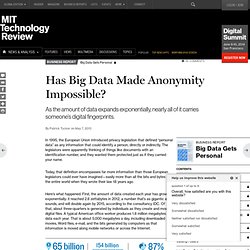
The legislators were apparently thinking of things like documents with an identification number, and they wanted them protected just as if they carried your name. Today, that definition encompasses far more information than those European legislators could ever have imagined—easily more than all the bits and bytes in the entire world when they wrote their law 18 years ago.
Here’s what happened. First, the amount of data created each year has grown exponentially: it reached 2.8 zettabytes in 2012, a number that’s as gigantic as it sounds, and will double again by 2015, according to the consultancy IDC. Of that, about three-quarters is generated by individuals as they create and move digital files. Much of this data is invisible to people and seems impersonal. We’re well down this path already.